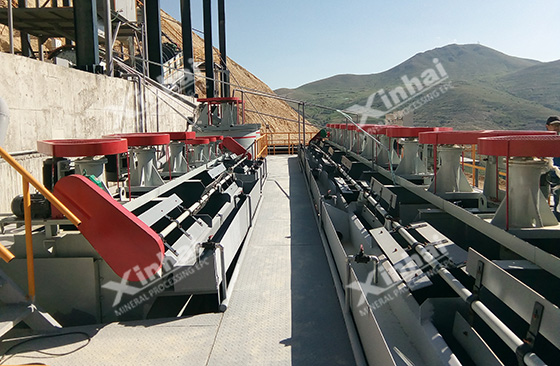
Due to the different types of gold ores, the gold extraction methods from ore are different, mainly including the gravity separation method, flotation method, amalgamation method and cyanide leaching method, resin in the pulp method, carbon paste adsorption method and heap leaching method. For some types of gold ores, the combined gold extraction methods from ore are often used in the gold processing plant.
There are many gold extraction methods from ore used in the production. The following are often used in the gold processing plant:
This gold extraction method from ore is particularly suitable for processing quartz-vein, gold-bearing, oxidized ore with free or coarse gold particles. The raw ore is first treated by gravity separation method, where high-grade gold concentrate is recovered and sent directly for smelting. The middlings and tailings generated from gravity separation are then further processed through cyanide leaching to maximize overall gold recovery.
Gold is produced from the quartz vein ore in fine or fine dispersion state. The gold ore has deep oxidation degree and does not contain Cu, As, Sb, Bi and carbon. This kind of ore is most suitable for the all-slime cyanidation CIP method.
CIP process is one of the main gold extraction methods from ore, which has the advantages of high recovery rate, strong adaptability to ores and it has the ability to extract gold locally.
CIP process mainly consists of four steps: leaching of gold-bearing ore in cyanidation solution, adsorption of activated carbon, desorption electrolysis of gold-bearing carbon and smelting of gold sludge. Since the cyanide used in this gold extraction methods from ore is highly toxic and easy to pollute the environment, it is suggested to adopt eco-friendly gold leaching reagent in the practice, which is low-toxicity, environmental-friendly and without changing the original cyanide equipment and process.

This gold extraction method from ore combines gravity separation and the flotation method to achieve higher overall recovery. Coarse and free gold is first recovered through gravity separation, while the remaining tailings are further treated by flotation. This method is particularly applicable to gold-bearing oxidized ores and ores associated with free gold, delivering a higher recovery rate compared with a single flotation method.
This gold extraction methods from ore mainly have two schemes:
(1) Flotation-concentrate cyanide leaching method. It is suitable for the treatment of gold-bearing quartz vein ore and quartz pyrite ore which have a close symbiotic relationship with gold and sulfide.
(2) Flotation-roasting-cyanide process. This process is suitable for the treatment of floatable minerals containing harmful cyanidation.

This gold extraction method from ore is suitable for treating fine gold particles, sulfide ore containing gold quartz vein with high floatability, as well as polymetallic gold sulfide ore containing carbon (graphite) ore. The single flotation method is particularly effective where gravity separation is inefficient, offering good adaptability for complex and fine-grained gold ores.
This gold extraction method from ore is mainly based on flotation and is suitable for ores where gold has a close symbiotic relationship with sulfide minerals and can only be economically recovered by smelting. The flotation–gravity separation method is also applicable to gold-bearing quartz vein ore with unevenly disseminated grain size, delivering a higher overall recovery compared with a single flotation method.
The heap leaching method is a type of cyanide leaching method, which is suitable for treating ores with low-grade gold. This gold extraction method from ore has the advantages of a simple process, less investment and low cost.

This gold extraction methods from ore is suitable for treating primary quartz vein deposits and oxidized ores containing coarse gold. Gold extraction by amalgamation method is an ancient and popular gold extraction methods from ore. It has been proved that adopting the amalgamation method in the gold extraction methods from ore can recover a part of gold grains in advance, and obviously reduce the loss of coarse gold grains in tailings.
The above eight gold extraction methods from ore are applied according to the various internal structures, ore types, and ore properties.
To find out more about our products and solutions, please fill out the form below and one of our experts will get back to you shortly.